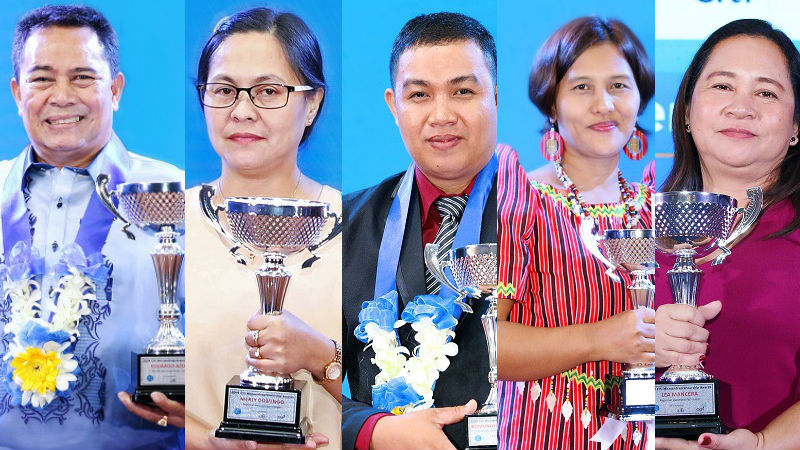CMA honors different kind of heroes

From left: Citi Microentrepreneurship Awards (CMA) national winner Eduardo Azores; Regional Awardee for Visayas Merly Domingo; Youth Microentrepreneur of the Year Romualdo Blanco Jr.; Special Awardee for Preservation of Traditions Caroline Jamias and Regional Awardee for Luzon Lea Mancera. –CONTRIBUTED PHOTOS
A man who believes in inclusion and loving even one’s enemy was the national winner of this year’s Citi Microentrepreneur of the Year Award (CMA).
Eduardo Azores, owner of Ali-Ali Pastil in Koronadal City, received P200,000 in cash and other prizes in kind for topping this year’s CMA search, a signature initiative of Citi Foundation and jointly undertaken by Citi Philippines, Bangko Sentral ng Pilipinas (BSP) and Microfinance Council of the Philippines, Inc. (MCPI).
Other winners of the annual search, now on its 17th year, are Lea Mancera of Daniel’s Handicraft Weaving and Metal Frame, regional awardee for Luzon; Merly Domingo of Ebina Garment Manufacturing, regional awardee for Visayas; Lucrecia Neri of Manna’s Alternatives Herbal Products and AtiManna Organic Hub, regional awardee for Mindanao; Romualdo Blanco, Jr. of PK Maja’s Special, Youth Microentrepreneur of the Year; Rolando Pega, spring onion farmer, and Rosanna Sinapilo, owner of Coco Deli, special award for agri micro-business; and Caroline Jamias of Carol Line’s Ethnic and Fashion, special award for preservation of tradition.
Each of them received P100,000 in cash.
BSP Gov. Benjamin E. Diokno, during simple awarding ceremonies at the central bank, said the lives of the awardees were proof that microfinance was “a tool for improvement.”
He said they were heroes for their acts of courage.
“Despite the challenges, they plodded on,” undeterred by the fact that the “journey was rough and difficult,” driven by the need to support families and communities that relied on them.
Micro, small and medium enterprises (MSMEs), the BSP governor said, had made significant contributions to employment generation, innovation and development.
“We cannot talk about inclusive growth without MSMEs,” Diokno added.
Aftab Ahmed, chief executive officer of Citi Philippines, said how the winners achieved financial independence was “truly inspirational.”
The top winner tried different jobs before finding the perfect fit, getting the capital from Rizal Microbank.
“The winners started wanting only to help their families but discovered opportunities to help other people,” Ahmed pointed out. They also proved that hard work and determination could achieve their goals.
Azores, who turned a modest business of serving pastil, a dish of steamed rice with shredded beef, chicken or fish (like rice toppings in Luzon) wrapped in banana leaf, into a multimillion endeavor with more than 40 employees, stressed the need to give respect and love to business partners, like suppliers.
He did not let himself be overcome by emotions despite the loss of his wife and partner. Azores believed in living within one’s means but also in keeping his money in a secure place, like a bank.
Referencing a major problem in Mindanao where many people lost hard-earned money to pyramid schemes, Azores said “people get easily tempted by [the promise of high returns … nobody can pay interest rates of] 30 percent.” He stressed the need to pay his employees right wages and to show them love and respect, like they were members of his own family.
“We have to care for our fellow human beings,” Azores said, “Be happy, accept everybody for who they are and do what is right for others.”
Mancera, who expanded her husband’s family business with the help of Kabuhayan sa Ganap na Kasarinlan Savings and Credit Cooperative, is providing jobs not only to her neighbors in Las Piñas but also some 100 inmates at the National Penitentiary or New Bilibid Prison in Muntinlupa City.By employing the inmates, she said they were now able to help with their families’ financial needs.
Cebuana Domingo parlayed her skills as a sewing trainor for the Mactan Export Processing Zone Authority into a garment manufacturing business making uniforms, sports jerseys, etc. with the help of Taytay sa Kauswagan Inc.
Surviving cancer gave Neri of Midsayap, Cotabato, “the gift of compassion,” she said. Card Bank, Inc. helped her grow her business, which now has more than 30 employees. But Neri said the real capital she infused into her business was love and gratefulness and her profit was peace of mind.
Blanco, while working in Manila, learned how to make puto (rice cake) and decided it could be a profitable business. Returning to his hometown of San Pascual, Batangas, he used his savings to start his puto business. A loan from Bangko Kabayan enabled him to add more products to his repertoire.
A former all-around laborer, Pega, with the help of his brother-in-law, started a spring onion farm in Pangil, Laguna, when Ahon sa Hirap Inc. (AHI) looked for suppliers of the vegetable for a major fastfood chain.
Training under the fastfood chain and with borrowed capital from AHI, Pega now supplies spring onions to three major food chains and is head of the AGAP Farmers Association of Laguna.
Sinapilo and her husband were in search of a stable source of income when they returned to their hometown of Candelaria, Quezon. They decided to pursue the old family business of coco sap farming and, with the help of ASA Philippines Foundation, was able to have a full-scale plantation and open Coco Deli, producer and distributor of different coconut-based products like sugar and cider vinegar, as well as mushroom chips.
Jamias of Tabuk City breathed new life into the Kalinga’s weaving tradition, coming up with new designs as well as uses for the fabrics, aside from the usual bags, blankets, vests, wraparound skirts, etc. With the help of Alalay sa Kaunlaran Microfinance Social Development, Inc., she has added dresses and various accessories to her products. –CONTRIBUTED INQ

